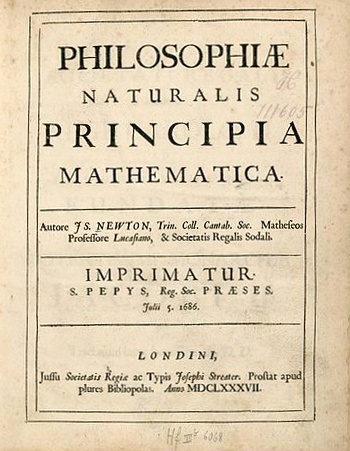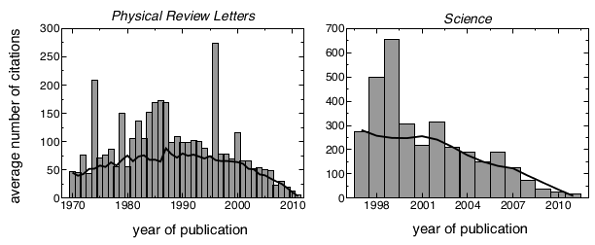Peer Review
October 8, 2012
Peer review forces
scientists to design their
experiments well enough that there's no question of the result; or, craft their
theories such that there are no
divide by zero errors. Today, we only think of
computers when we hear the phrase, "divide by zero," but before computers this was a
subtle error that allows you to prove anything. For example,
a = b
a2 = ab (multiplication by a)
a2 - b2 = ab - b2 (subtracting b2)
(a - b)(a + b) = b(a - b) (factoring)
a + b = b (through division by (a - b))
b + b = b (since a = b)
2b = b
2 = 1
So, what happened? Our problem was at the
division by (a - b), which is division by zero, since a = b. It's easy to see this in such simple
equations, but the equations of
physics are not that simple, so such problems are harder to find. It's reported that
Einstein made such an error in one of his published papers, but I could find no definitive reference.
Stephen Wolfram thinks the
universe is a computer; or, at least, it can be analyzed as one (perhaps I simplify). His ideas, presented in his book,
A New Kind of Science,[1-2] were a lightning rod for criticism by other scientists, so much so that I have a bound volume of critical articles about his book that's nearly as thick as the book, itself. This is quite impressive, since his book is nearly 1200 pages.[2]
The interesting thing is that all this criticism did not deter me from buying the book. After all, the topic was interesting to me since I've worked in science and with computers; and, something having that much
buzz must be worthwhile reading, whether my opinion would eventually fall to one side, or the other. I recommend the book (freely available online, and in
ebook format), but it's no
Principia.

Title page from the 1687 first edition of Isaac Newton's Philosophiae Naturalis Principia Mathematica, commonly called the "Principia."
In this book, Newton integrated (pun intended) physics and mathematics. Wolfram attempted to do the same with physics and computation.
(From the Université de Strasbourg, via Wikimedia Commons)
This idea, that criticism of scientific papers does not always detract from their popularity, is analyzed by
Filippo Radicchi in an aptly named paper, "In science "there is no bad publicity": Papers criticized in technical comments have high scientific impact."[3] In this case, the comments analyzed are the formal, published comments on papers that are encouraged by some
journals, sometimes as
letters to the editor.[4]
Technical comments are worrisome to authors, since they are almost always negative. There's the idea that criticized papers will have low
scientific impact, but Radicchi found otherwise. In analysis of commented papers in thirteen major publications, he found that commented papers have
citation rates much higher than those of non-commented articles.
Not only that, but those papers are also the most cited in those journals, and Radicchi thinks that commentary on a paper is a predictor of its future impact. This is a validation of the popular
proverb that "
any publicity is good publicity," in which even negative criticism is beneficial. Radicchi says this demonstrates "the fundamental importance of scientific disputes for the production and dissemination of knowledge."[3]

Citation rates as a function of year for commented and uncommented papers in Physical Review Letters and Science. The average citation rates for commented papers are shown as bars, and the average of uncommented papers is indicated by the lines. A single commented paper in Physical Review Letters in 1996 had more than 20,000 citations.[5] (Fig. 1 (modified) of ref. 3, from the arXiv Preprint Server)
In any event, there's one comment that no scientist wants to hear. The comment, "
...Not even wrong," was first spoken by the
theoretical physicist,
Wolfgang Pauli. It means that what's proposed can't be
falsified by an experiment, so it falls outside the realm of science.
References:
- Stephen Wolfram: A New Kind of Science, Wolfram Science Web Site.
- Stephen Wolfram, "A New Kind of Science," Wolfram Media, May 14, 2002, 1192 pp. (via Amazon).
- Filippo Radicchi, "In science "there is no bad publicity": Papers criticized in technical comments have high scientific impact," arXiv Preprint Server, September 22, 2012.
- For example, see Linus Pauling, "Icosahedral quasicrystals of intermetallic compounds are icosahedral twins of cubic crystals of three kinds, consisting of large (about 5000 atoms) icosahedral complexes in either a cubic body-centered or a cubic face-centered arrangement or smaller (about 1350 atoms) icosahedral complexes in the β-tungsten arrangement," Proc. Natl. Acad. Sci., vol. 86, no. 22 (November 1, 1989), pp. 8595-8599 and Peter A. Bancel, Paul A. Heiney, Paul M. Horn and Paul J. Steinhard, "Comment on a paper by Linus Pauling," Proc. Natl. Acad. Sci., vol. 86, no. 22 (November 1, 1989), pp. 8600–8601.
- John P. Perdew, Kieron Burke and Matthias Ernzerhof, "Generalized Gradient Approximation Made Simple," Phys. Rev. Lett., vol. 77, no. 18 (October 28, 1996), pp. 3865-3868.
Permanent Link to this article
Linked Keywords: Peer review; scientist; experiment; theory; divide by zero error; computer; mathematical fallacy; division by zero; subtle error; division; equation; physics; Albert Einstein; Stephen Wolfram; universe; A New Kind of Science; buzz; ebook; Principia; Isaac Newton; Philosophiae Naturalis Principia Mathematica; Wikimedia Commons; scientific journal; letter to the editor; impact factor; scientific impact; citation; proverbial phrase; proverb; any publicity is good publicity; Physical Review Letters; Science; quantum entanglement; arXiv; ...Not even wrong; theoretical physics; theoretical physicist; Wolfgang Pauli; falsifiability; falsified by an experiment.